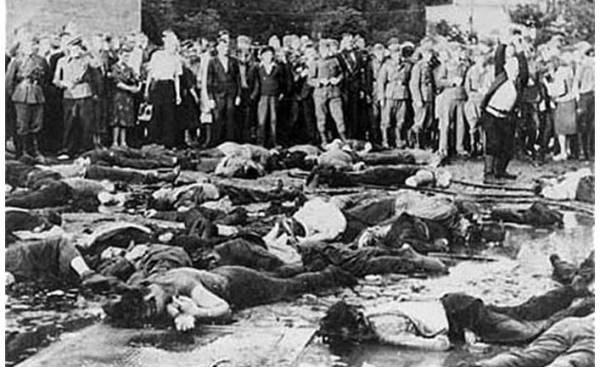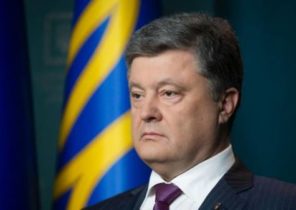
Effective cooperation of the Germans and Lithuanians became a death trap for the Jews of Lithuania. In Lithuania Jews were murdered patriots — ethnic nationalists, who had hoped to create a nation-state without Jews, Russians and poles. This in an exclusive interview to Delfi, the famous German historian Christoph Diekmann. Diekmann is a recognized scientist from the German Institute Fritz-Bauer studies the history and consequences of the Holocaust, in 2011 he wrote a fundamental work “the German Occupation policy in Lithuania 1941-1944”. He raises the moral question of why the Lithuanian society, seeing and hearing around killing Jews, not protest? In his opinion, for the most part is determined by the position of the Church, which was only concerned with the property of the baptized Jews. Diekmann said that during the war years in Lithuania was only a small part of the German army, so the Germans had to enlist the help of local residents. The historian said that Jews were murdered on the initiative of the Germans, but the Lithuanians did so voluntarily. He also admitted that before the German occupation, the pogroms in Lithuania was not.
Delfi.lt: doesn’t surprise you to learn that your book is still not translated into the Lithuanian language?
Christoph Diekmann: It is a great academic book, 1 thousand 600 pages. Well-known historians of Lithuania and England said that it should be translated, because it is one of the best historical books. The material I have collected 16 years 30 archives 7 countries. The writing process took 8 years. I believe that for the reconstruction of the events of the Holocaust in Eastern Europe, it is necessary to know German language. To understand victims, it is necessary to know Yiddish, and Hebrew help. To work with the Lithuanian sources, I learned to read in Lithuanian. I also read in Russian — it helped. The materials I gathered in 5 languages. Have knowledge of Polish, but I don’t own, unfortunately.
— In the Lithuanian society after 70 years after the Holocaust there was interest in this tragedy, trying to understand what had happened, which killed 200 thousand citizens of Lithuania. Why do you think now?
— This question you yourself must answer. When I came here the first time, in 1995, I found historians who wanted to understand what happened. It takes courage to understand, self — criticism is a sign of strength, not weakness. When a democratic society assesses their mistakes, it grows. It is necessary to change the attitude, stop blaming others. Lithuania, having lost a great state to the Black sea, blames the poles, Russian Jews. Glorification and himself a victim are two sides of the same coin. Soviet policy in the field of history relied on the myth of the victim and the hero, far from the real history of mankind.
— Do you think Lithuania is continuing this tradition?
Yes. The current policy in the field of the history of the conflict between the two camps. One civic patriotism (“we have killed our people”), another ethnic — nationalism (“we killed them”). In the territories of the former USSR, so you have a third model, the Soviet — sacrifice is the whole country or a hero, or both at the same time. Most importantly openly about his past and a critical attitude to the past. Criticism is not condemnation, is the analysis, the discernment of good and evil.
— Part of Lithuanian residents still find it difficult to accept that the Holocaust was attended by thousands of citizens, not a group of monsters. How much is actually in the Holocaust were the Germans, and how many Lithuanians helped them?
— According to the archives, all the Lithuanian administration ruled about 900 Germans and 20 thousand Lithuanians. Directly in the Holocaust was attended by about 6 thousand Lithuanians. The involvement of other persons depended on his position and functions. Personal guilt is necessary to prove, but I say: everyone knew that Jews are being killed, but why not protest? Lithuanians are very proud that, in 1943, in contrast to Latvia and Estonia, here failed mobilization in SS. The Lithuanians were negotiating the mobilization, demanded greater autonomy and other conditions. When negotiations failed, the Nazis “punish” the Lithuanians have sent a few dozen intellectuals to concentration camps. To mobilize Lithuanians to the German police failed. In may 1942 in Marijampole and Vilkaviskis protested against the confiscation of Lithuanians vehicles, horses, wagons — the women screamed, the men ran into the woods. This has been documented. After protests, the Germans decided not to. So, if you look from the perspective of the Lithuanians, if the Lithuanians did not help the Germans, they would have the opportunity to escape and hide. After all, in Lithuania there are some Germans. The whole German policy in Lithuania had to rely on cooperation with local institutions. Effective Lithuanian-German coalition has become a death trap for the Jews of Lithuania. So it was throughout Europe, not only in Lithuania. It is a moral question — why in Lithuania there were no protests?
Of course, people were afraid — they’ve already survived the Soviet occupation, exile to Siberia, and then the Nazis…
But I gave two examples of when people in 1942 and 1943, protested and nothing bad done with them. But the Church did nothing. In October 1941, was the seat of the conference of bishops, but they were discussing what to do with the property of the baptized Jews. Just a question. Yes, some priests protested, called temples, not to kill.
— Lithuania — Catholic region, maybe the apathy of the people and due to the apathy of the Church?
— This led to to a greater extent. The priests served in service battalions, shot Jews “fought with the devil”. Indeed, in the Lithuanian culture of the Jews equate hell — these strong stereotype, like the stereotype of a Jew-Bolshevik.
But let’s go back to the beginning of the occupation. Have you found any evidence that prior occupation in Lithuania were Jewish pogroms?
— Large pogroms and murder of Jews began only with the arrival of the Germans. Before that in Lithuania there were a lot of other crimes — robbery, rape, humiliation, murder of individuals. But there were no pogroms. The Germans hardly found people for the first pogroms in Kaunas.
— How many Lithuanians were accomplices of the Nazis?
— I don’t call such people collaborators. We are accomplices after the Second world war, call someone who betrays his country and works only with the occupier. Almost all people which declared accomplices, were patriots — ethnic nationalists. They did it in the name of their country. That’s the key: the Lithuanians, ethnic nationalists thought the Jews if not, Lithuania will be fine. We will be able to create a strong nation-state without Jews, Russians, poles. That was the idea. This is a radical ethnic nationalism, in the critical case, such people are ready to kill. Lithuanians hoped that the Germans will give them the opportunity to create an independent state. After all, once it has already happened. (…) After the occupation of 1940, the Lithuanians didn’t want to go over to the Bolsheviks, and therefore chose fascism.
— Can the indifference of the society to associate with greed?
— Why Lithuania is so many of the murder sites? When you shoot, there is always the danger of destabilization of the situation. If shooting Jews in a few hundred metres from the village or town and hear, see protests, it is better not to do. But continued to kill near the cities. Society didn’t react. Silent. But we know the horror stories, then people went there in search of gold, other assets. After all, in Lithuania there were many wealthy Jews, they lived in the center of the city, in beautiful homes. What happened when they died? Who settled in their homes, because they are not empty. Part took the German administration, part — Lithuanian, the rest divided between ethnic Lithuanians. All Lithuanian society profited from it. Many, not only killers. (…) If you take the property of the murdered Jews, even if you’re not an anti-Semite, in so doing, become them. Somewhere in the subconscious appropriation of Jewish property is justified — after all, they are “strangers,” moreover, “deserved” it.
— Who killed?
— It all happened on the initiative of the Germans, under the supervision of the Germans, the Lithuanians were the only performers, and not ideologues. We are guilty, without the Germans there would be no Holocaust, but you Lithuanians cooperated. Without it, history would have been different. But it was in Europe. Lithuania was no exception. So it was in Ukraine, Belarus, and Romania you have killed all their Jews…
— How much of the apathy stems from the fact that Lithuanians were poor peasants, and the Jews were traders, artisans, Lithuanians they were associated with gold, money, so they did not like?
— Does not have to follow national stereotypes. Whether the Jews are rich? No, only a small part. Most of the Jews of Lithuania were not rich. The Lithuanians were mostly peasants, took the Jews money or goods on loan. Did not the Jews, did not debt.
— What can we do today? We talk about the moral responsibility of the Lithuanians? This topic in Lithuania do not like.
We must dare and take a look at our history. The courage and the recognition of past mistakes is a sign of strength, not weakness.







